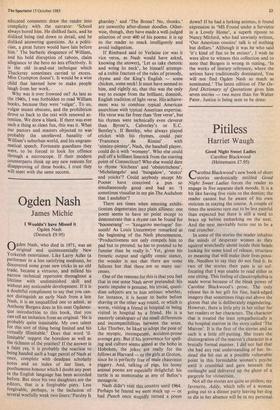Ogden Nash
James Michie
I Wouldn't have Missed it Ogden Nash (Deutsch £9.95)
Ogden Nash, who died in 1971, was an original and quintessentially New Yorkerish entertainer. Like Larry Adler (a Performer in a less satisfying medium), he discovered some great new tricks in an old trade, became a virtuoso, and milked his narrow technical repertoire throughout a lifetime with undiminished skill and Without any noticeable development. If it is a doubtful compliment to say that you can- not distinguish an early Nash from a late Nash, it is an unqualified one to admit, as Anthony Burgess does in his neat Ogdanes- que introduction to this book, that you can tell an imitation from an original: 'He is probably quite inimitable. My own talent for this sort of thing being limited and his virtually illimitable.' Does that word 'il- limitable' suggest the boredom as well as the richness of the prairies? If the answer is a faint yes, it is probably the reaction to being handed such a huge parcel of Nash at once, complete with deadpan scholarly notes and an index of last lines, a posthumous honour which I doubt any poet in the English language has been accorded before. But since his two daughters are the editors, that is a forgivable piety. Less forgivable, perhaps, is the inclusion of several woefully weak two-liners:Parsley Is
gharsley.' and 'The Bronx? No, thonks.' are unworthy after-dinner doodles. Other- wise, though, they have made a well-judged selection of over 400 of his poems: it is up to the reader to snack intelligently and avoid indigestion.
If Rimbaud said to Verlaine (or was it vice versa, as Nash would have asked, knowing the answer), 'Let us take rhetoric and wring its neck', he himself attempt- ed a treble fracture of the rules of prosody, rhyme and the King's English — some chicken, some neck! It must have seemed to him, and rightly so, that this was the only way to escape from the brilliant, donnish, English tradition of light verse. His achieve- ment was to combine typical American anarchism with typical American expertise. His verse was far freer than 'free verse', but his rhymes were technically even cleverer than Byron's, Calverley's or E.C. Bentley's. If Bentley, who always played cricket with his rhymes, could pair 'Francesca da with `niminy-piminy', Nash, the baseball player, could do it with 'wonaeny'. Who else could pull off a brilliant limerick from the starting point of Connecticut? Who else would dare to rhyme 'kitchens' and 'obstetritchens', 'Michelangelo' and 'bungalow', 'stoics' and yoicks'? Could anybody except Mr Pooter have contrived a pun so simultaneously good and bad as: 'I sometimes visualise in my gin The Audubon that I audubin'?
There are times when amusing exhibi- tionism degenerates into plain silliness: one poem seems to have no point except to demonstrate that a rhyme can be found for 'boomerang' — 'kangaroo meringue' for- sooth! As Louis Untermeyer remarked at the beginning of the Nash phenomenon, 'Productiveness not only compels him to pad but to pretend: he has to pretend to be funnier than he really is.' Yet, given his frenetic output and rigidly comic stance, the wonder is not that there are some failures but that there are so many suc- cesses.
One of the reasons for this is that you feel that in one sense Nash never pretended: his poetic impulse is genuine, his trivial, quoti- dian subjects are to him serious: whether, for instance, it is better to bathe before shaving or the other way round, or which is worse, visiting a friend in hospital or being visited in hospital by a friend. He is a masterly cataloguer of the small differences and incompatibilities between the sexes. Like Thurber, he liked to adopt the pose of the myopic, incompetent, accident-prone average guy. But if his irreverence for spell- ing and culture seems aimed at the hobo in Hoboken, the jokes are really for the fellows at Harvard — or the girls at Groton, since he is perfectly free of male chauvinist piggery. And, talking of pigs, his loony animal poems are especially delightful: his turtle is as memorable as any of Belloc's menagerie.
Nash didn't visit this country until 1964. Perhaps he feared we were stuck up — or had Punch once stupidly turned a poem down? If he had a lurking animus, it found expression in 'MS Found under a Serviette in a Lovely Home', a superb riposte to Nancy Mitford, who had unwisely written, 'Our American cousins' talk is of nothing but dollars.' Although it was he who said 'it's kind of fun to be extinct', I wish he were alive to witness this collection and to note that Burgess is wrong in stating, 'In the works of literary reference, where the serious have traditionally dominated, You will not find Ogden Nash so much as nominated.' The latest edition of The Ox- ford Dictionary of Quotations gives him seven entries — two more than for Walter Pater, Justice is being seen to be done.










































 Previous page
Previous page